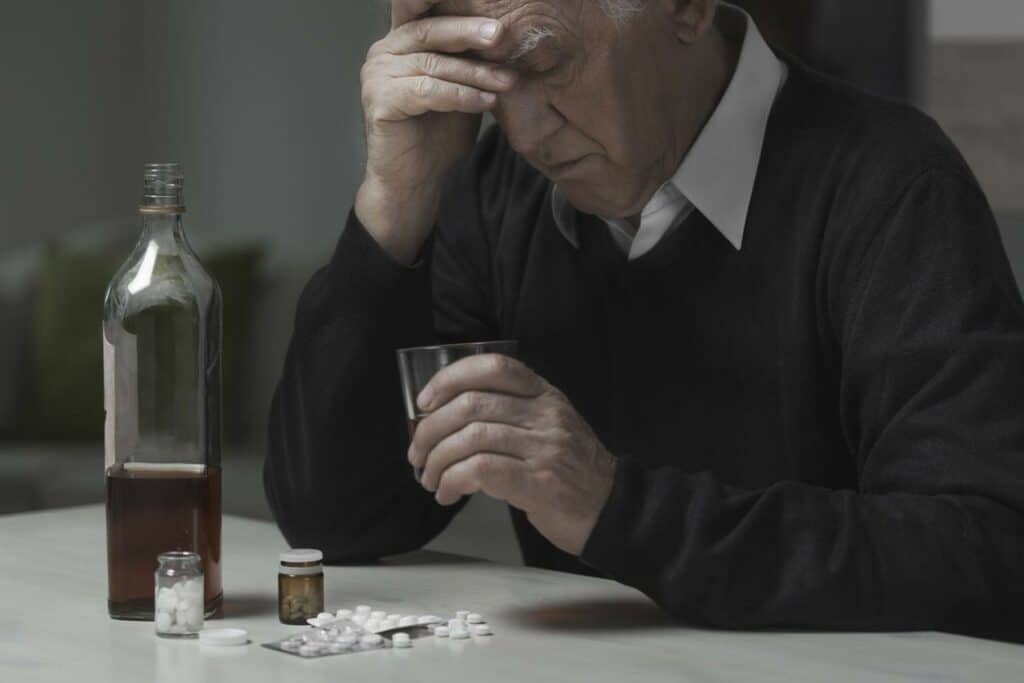As our population ages, more and more family members become senior caregivers for their loved ones. Caregiving is rewarding but also demanding work, often without official breaks, holidays, or sick days. Additionally, it can be isolating and stressful, leading to depression.
Studies have shown that depression is much more common among caregivers than the general population. Astonishingly, close to 50% of informal caregivers who provided care for more than 40 hours a week were diagnosed with symptoms of depression according to a study published in 2023.
Of course, not all caregivers will develop depression, but the reality is that caring for an aging loved one who can not perform their daily activities independently or is experiencing cognitive decline or dementia can take its toll on a person.
If you suspect that you may be suffering from depression, reading this article might give you some ideas on how to deal with it. Contacting us at Amy’s Eden can provide relief in your daily tasks as we can support you in your caregiving journey with respite care, sitting service, or in-house caregiving.
What Is Depression?
Depression is a serious condition that can affect all aspects of a person’s life and cause severe damage to their health, relationships, job, and sense of well-being.
Depression can be defined as the emotional response to a persistent feeling of frustration and disappointment.

Generally, the weaker forms of depression can not be discerned from experiencing loss or dissatisfaction. Severe depression, however, can lead to suicide attempts, psychological and interpersonal problems, or unemployment.
What Leads To Depression?
Every person may experience depression in a different way and to a different degree. If untreated, this condition can progress and become more challenging to manage. Therefore it is crucial to know what can cause depression to occur, what signs to look for, and what to do if you feel depressed.
As a caregiver, you are highly dedicated to helping your beloved senior, but you may neglect some of your personal needs in the process.
This could mean that
- You don’t get enough sleep
- You are exhausted and stressed
- You have problems at work
- You spend less time with the rest of your family
- You don’t get any downtime
- You don’t do your favorite activities
- You don’t do any physical exercises or sport
- You are easily irritated and worried
If one or more of the statements listed above becomes a constant in your life, you may be at risk of developing depression.

Adding to these might be worries about the condition of your older loved one such as:
- will they get better;
- will they be safe;
- will their pain get worse;
- will they need medical assistance;
- will they become incontinent
and so on, can bring you further distress.
Depression is a dire condition that, until recently, our society used to dismiss and not consider life-threatening. However, today this attitude has generally shifted, and depression is regarded as serious but treatable, especially if it is diagnosed early on.
Caregiver’s Depression Signs To Watch Out For
At Amy’s Eden, we believe that being aware of the signs and symptoms of depression in caregivers is crucial for its early diagnosis and successful treatment.
If you notice any of the following symptoms persisting for more than 15 days, you should make an appointment to see a professional.
- Your sleeping pattern has changed. Either you feel sleepy and need to sleep longer hours; you can’t fall asleep; you wake up too early, or you wake up during the night multiple times.
- You have gained or lost weight due to changes in your dietary habits.
- You feel exhausted all the time, even early in the morning.
- You have become easily irritated, frustrated, or enraged and have mood swings.

- You have lost interest in any social outings or other activities that used to be joyful for you.
- You feel inadequate, worthless, or feel like nothing you do is good enough.
- You feel numb, incapable of emotions, or incredibly sad, and hopeless.
- You experience brain fog or difficulty concentrating, thinking, or planning ahead.
- You have suicidal thoughts, or you think of death or dying.
- You experience symptoms that haven’t gone away after treatment. These could be chronic pain, headache, hair loss, stomachache, or other digestive problems.
In addition to consulting with a health specialist, there are some coping strategies directed toward decreasing stress levels and maintaining your mental health that you can adopt.
How To Prevent And Manage Depression
Before going into advice on how to prevent getting depressed or manage this condition without medication, it is imperative to mention what you can do if you or someone you know is having self-harming or suicidal thoughts.
- Ask the person directly, ‘Are you thinking of suicide?’
- Call 911 or 988, or text TALK to 741741 to connect with a trained counselor.
- Wait with the person until help arrives.
- Collect all objects that can be harmful from the vicinity.
Prevention can save lives! The Suicide and Crisis Lifeline is a network of crisis centers that provide free and confidential support to people at risk of suicide or other emotional crises. It is operational 24 hours daily, seven days a week, at phone number 988.
The following are ways you can prevent and manage depression.
Take care of your body
According to the National Alliance on Mental Illness, one of the best ways to prevent depression from creeping in is to take care of your physical health. This means observing the following:
- Exercise regularly – physical activity is good not only for your heart and muscles. When we exercise, our body starts producing endorphins and serotonin, the hormones of satisfaction and happiness. And perhaps you can even do this together with your beloved senior. There are easy and fun senior exercises both of you can try.

- Follow a healthy diet – nutritiously rich food that supplies your body and brain with enough essential amino acids and microelements so that they can function well. It is important to feed our bodies sufficiently at any age. Why not share the meals you may already be preparing for your loved one? Here are some superfood recipe ideas.
- Maintain a good night’s sleep – it is not a coincidence that sleep disturbances are one of the first symptoms of depression. Sleep is vital for our well-being, and without enough hours of rest, our brains can not function normally, which means that our memory and thinking abilities become affected.
- Avoid alcohol use – it is a misconception that alcohol helps us relax. In fact, it has been established that alcohol intake accelerates the feeling of depression. This is due to the fact that spirits lower serotonin levels, which can make you even more depressed.

- Practice meditation and relaxation – these are the two most impactful ways to regulate your stress levels and fuel your body with the right energy. They are easy to learn, and if you practice them regularly, you can easily apply them when feelings of anxiety or depression arise.
Adopt Positive Mental Practices
- Allocate time for yourself. Regardless of our daily responsibilities, we need time to unwind; otherwise, we can hurt ourselves. This will mean that we won’t be able to perform our duties as well as we need or want to. It could be hard to find time for yourself when you are taking care of someone with a condition, but Amy’s Eden got your back. You can use our elderly care services and get some respite or professional care for your loved one.
- Avoid thoughts of guilt. Notice the way you speak to yourself in your head; is it in a put-down or guilt-ridden manner? Try to steer away from utterances such as ‘I should be better at this!‘, ‘Oh, I shouldn’t be so bossy!‘ or ‘How stupid of me!‘ They are not only unproductive and depressive thoughts, but could even be harmful. Instead, attempt to observe your feelings without being judgmental about them or yourself. This way, you can manage your stress levels better and feel more in control.
- Focus on positivity. It may sound silly, but when we create the habit of noticing the good moments, the uplifting little instances throughout our days, those tend to amplify. You can start by writing down one good thing that happened each day. A positive mindset and gratitude for the small joys in life can potentially change your life.
Lean on family and friends
Asking for help can sometimes be challenging, but it does not show weakness. Your family may feel excluded and reluctant to offer their help because you look like you have everything under control. Talk with them about your struggles, and ask for their advice or contributions.

And if that is not possible, find support groups for caregivers around you. No man is an island. We all need to feel heard and understood. Plus, one can learn a lot from others’ experiences.
Don’t push your friends away, even if you have time for them only occasionally. Stay in touch, schedule some hangouts, and do not be reluctant to share your experiences with them.
Get a professional caregiver to help
Sharing the responsibility of caregiving with someone who has had professional training and experience can be extremely useful. In addition, at Amy’s Eden, we are constantly striving to find the perfect match between a caregiver and a care recipient. If you aren’t sure what kind of care is best for your loved one, please contact us to schedule a call.
Get medical treatment
After being diagnosed with depression, your healthcare provider will probably assign psychological treatment accompanied by antidepressant medications. Today, in 2023, mental health specialists believe that simply taking antidepressants is not enough to combat this condition. Psychotherapy is a vital part of the treatment process as it can help you understand your thoughts, feelings, and behaviors. It can also aid you in overcoming negative thoughts and creating a positive self-image.

Other forms of therapy, suggested by Medical News Today, include taking
- Natural remedies or herbal extracts, such as St.John’s wort, Ginseng, or Chamomile;
- Supplements such as Omega-3 fatty acids, S-adenosyl methionine (SAMe), and 5-hydroxytryptophan which can help boost the production of serotonin in the body; and
- Alternative therapies like acupuncture, aromatherapy, light therapy, and image therapy.
Final thoughts
Being a caregiver to an aging loved one is a noble, worthy, and satisfying duty. However, it can also be demanding and often stressful work. Caregivers can develop symptoms of depression over time, and it is important to be aware that this is not uncommon.
Knowing what to look for and how to protect your own mental health will arm you with the tools to prevent or take measures on time so that you can stay on top of your health and continue to be able to provide care for your loved ones.
Realizing that you need help and finding respite with Amy’s Eden is as easy and quick as a phone call. Contact us today to schedule a meeting or find a caregiver for in-home care for your beloved!




